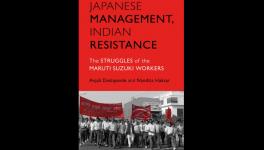Maruti Struggle: Claims of Indiscipline Baseless
In the article named Workers' struggle in Maruti Suzuki published in The Hindu, the authors had analysed the dynamics of the ongoing workers’ struggle demanding a union of their own in the Manesar plant of Maruti Suzuki India Limited (MSIL).
The article underlined MSIL’s steady growth of sales as well as its increasing contribution in Suzuki Motor Corporation’s global automobile sale and profit. Such increasing sales and profit of MSIL ensured ballooning salaries of MSIL's management group, while real wages of the workers got squeezed. Adding to this, due to the punitive salary structure of MSIL, workers face disproportionate salary cuts if they take leave (even if leaves are due); e.g. a permanent worker may face a salary cut of Rs. 8000/- if he takes five days leave in a month. The authors concluded that the workers aggrieved by such unjust policies of the management are very much within their political and legal right to demand a union of their own.
In response, the General Manager-Corporate (GM-C) of MSIL alleged the authors for having “left out the management's view, thus distorting the picture.” He stated that the current situation has arisen due to indiscipline of the workers causing quality problems in cars. The article holds 'a section of workers' to be responsible for the stand-off claiming that the majority of the workers are with the company and are committed to its growth.
Following is the response of the authors to management's claim.
Maruti Struggle: Claims of Indiscipline Baseless
In his response to our article “Workers' Struggle in Maruti Suzuki”, the General Manager-Corporate (GM-C) of Maruti Suzuki India Limited (MSIL) has alleged that we have “left out the management's view, thus distorting the picture”. (Hindu Op-Ed Page, September 29). Let us see whether he has been able to clear the air by presenting credible facts and persuasive arguments on behalf of the MSIL management.
Heart of the Matter
According to the GM-C, the heart of the problem at the Manesar plant is the ‘indiscipline’ displayed by ‘a section of workers’ over the past two months: refusal to follow instructions, resorting to go-slow, manhandling a supervisor and ‘deliberately causing quality problems in cars’. Had this been the case, why has no show-cause notice been issued or chargesheet prepared against that ‘section of workers’ with concrete evidence of such ‘indiscipline’? Why has the MSIL management resorted to summary dismissals? If only a ‘section of workers’ are responsible, there is hardly any justification for asking the entire workforce of over 2500 workers to sign a ‘good conduct bond’.
The fact of the matter is that the entire workforce in the Manesar plant is upset with the way the management is stonewalling the demand for recognising the Maruti Suzuki Employees Union (MSEU), an independent union on which the workers repose their faith. The existing Maruti Udyog Kamgar Union (MUKU) is widely perceived to be a co-opted union by the workers. Earlier, in June this year, the workers of the Manesar plant went on a strike to press for the recognition of the MSEU. The management responded by dismissing 11 workers. After a 13 day strike a settlement was reached and the dismissed workers were reinstated. However, all the workers suffered wage cuts for participating in the strike, with regular workers’ wages cut for 26 days (i.e. double the number of days they were on strike).
This backdrop has been conveniently avoided by the MSIL GM-C in his response. It is the intransigent refusal of the MSIL management to recognise the MSEU and their resort to hire and fire at will which lies at the heart of the problem. It is clear that the management has no argument to offer on this central issue.
‘Good Conduct Bond’
The MSIL GM-C has mentioned that the workers have agreed to sign the ‘good conduct bond’, which is derived from the Certified Standing Orders and is meant to reaffirm that workers will follow discipline on the shop floor. The fact is that the workers do not want to execute such a bond voluntarily. They are being coerced and compelled by the MSIL management to do so. Why has this bond become necessary today, four years after the plant has been in operation? The outgoing Union Labour Secretary had stated on Sept 1, 2011 that “It is illegal for any company to force its workers to sign a bond and the workers are free to negotiate their terms of employment”.1
The Certified Standing Orders referred in the bond are also not in keeping with the Model Standing Orders framed under the Industrial Employment (Standing Orders) Act, 1946. While the Model Standing Orders list 11 acts of misconduct which can warrant suspension or dismissal, the standing orders for the MSIL workmen lists 103 acts constituting major misconducts, which can lead to major disciplinary actions like dismissal without notice, suspension without wages for 15 days etc. These include ‘lack of proper personal appearance, sanitation and cleanliness’, ‘obtaining or attempting to obtain leave for absence on false pretensions’, ‘remaining in toilets for a longer period of time’, ‘habitual neglect of cleanliness’ etc.
These provisions can be applied arbitrarily by the management and makes the workers vulnerable to victimisation. The listing of 103 such acts warranting dismissal reveals the draconian attitude of the MSIL management. The management seems to think that the best way to ensure smooth operations in the plant is to keep the workers in a perpetual state of fear, intimidation and subservience.
The fact that such outrageous standing orders were certified by the Labour department of the Haryana government exposes its connivance with the MSIL management. The certifying authority (Deputy Labour Commissioner) has also violated the rules framed under the Industrial Employment (Standing Orders) Act, 1946. There was no consultation with trade union/workers’ representatives of the Manesar plant on the draft of the standing orders. Neither was any opportunity provided to the workers’ representatives through notice in Form II to make 0bjections to the draft standing orders. The legal procedure was deliberately circumvented.
This is proved by the fact that the workers’ copies of the final certified standing orders were sent to four trainees of the plant through the management on a date (January 25, 2007) which was two months earlier to the date when the certified standing orders were sent to the management (March 25, 2007). The standing orders based on which the ‘good conduct bond’ has been drafted, are therefore questionable on legal grounds.2
Exploitation of Workers
Unable to contest any of the facts and figures that we presented regarding the company’s profits and workers’ wages, the MSIL GM-C tried to brush them aside for having ‘little relevance’ in the ongoing negotiations. Their relevance actually lies in providing a truthful picture of the state of affairs in Maruti Suzuki, where the company’s burgeoning profits from its Indian operations are not being duly shared with the workers.
The GM-C asserts that MSIL workers are among the best paid for ‘his category of skill, qualification and experience’; a worker having served 5 years earns Rs. 3 lakh per year and those with 10 years’ experience receive Rs.4.5 lakh. These figures are only relevant for the relatively small number of senior permanent workers of the Gurgaon plant. The Manesar plant is merely four years old. The annual wages of permanent workers in the Manesar plant hardly go upto Rs. 2.2 lakh and wages for all categories of irregular workers are all below Rs. 1 lakh per year. Moreover, the GM-C fails to mention that these are the maximum amounts which senior permanent workers can possibly earn. If they take any day as leave in the course of the year – even if leaves are due – their pay is cut at the rate of Rs. 1200 per day of planned leave and Rs. 1800 per day of unplanned leave.
What is most glaring is the GM-C’s total silence about the shrinking number and proportion of permanent workers in the MSIL’s workforce. The Gurgaon plant had 5500 permanent workers in 2001, around the time when the central government’s 50 per cent stake in Maruti Udyog was being divested. By 2007, this had shrunk to 2800 and the rest of the 4000 odd workers in the Gurgaon plant were trainees, contract workers and apprentices. By 2011 the number of permanent workers in the Gurgaon plant has further shrunk to around 2500.
As far as the Manesar plant is concerned, as we had pointed out in the previous piece, 65 per cent of the workforce comprises of trainees, contract workers and apprentices. They are made to do jobs of a regular nature in brazen violation of labour laws. The GM-C has only confirmed our criticisms by remaining silent on them. The truth is that the majority of the MSIL workers are irregular, who are underpaid and exploited. The management saves significant labour costs by employing these non-permanent workers, dividing them into different categories and underpaying them. This ugly reality of ‘divide and exploit’ cannot be concealed by offering homilies on ‘robust systems’ and ‘participative forums’.
Conclusion
The GM-C’s response has sought to differentiate between ‘a small section of misguided people’ who are trouble-makers as opposed to ‘the large majority of workers’ who are committed and hard working. The fact is that ‘the large majority of workers’ of the Manesar plant want the ‘small section of misguided people’ – who the MSIL is hell bent on dismissing – to represent their voice through the MSEU. That is why they are agitating collectively to take back their 62 colleagues; not because of any outside provocation but through their own awareness about their exploitation and evolving consciousness about their rights. This will also ensure that the prosperity of the MSIL is not cornered by the management alone and shared with the workers in a fair manner in future.
The fact that they are refusing to be brow-beaten by the management’s high-handedness shows that the MSIL workers are quite aware of their interests. We stand in solidarity with their just cause and hope they will succeed in their struggle.
1 See “Outgoing labour secy challenges Maruti’s HR practice”, Financial Express, September 2, 2011.
2 Dipankar Mukherjee, “Has Manesar Become Suzukiland?”, Peoples’ Democracy, September 19-25, 2011
Maruti Suzuki Ertiga launched; priced from Rs.5.89 lakhs onwards
Get the latest reports & analysis with people's perspective on Protests, movements & deep analytical videos, discussions of the current affairs in your Telegram app. Subscribe to NewsClick's Telegram channel & get Real-Time updates on stories, as they get published on our website.
























